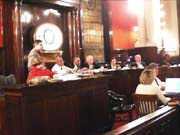The City Council introduced the 2003-2004 budget at a special meeting Wednesday night, more than half a year late. After months of debating a debt restructuring plan that Mayor Glenn Cunningham said was necessary to close a $21 million budget gap, the mayor presented the council with a $375 million budget that included no layoffs, no tax increase and a $6 million deficit, possibly to be filled through a different type of debt restructuring.
The budget covers city spending from July 1, 2003 through June 30, 2004.
The gap was closed using a $29,045,276 surplus left over from last year. Business Administrator Carlton McGee was hesitant to tap into the reservoir of what he called “seed money,” and Cunningham’s spokesperson Stan Eason said that the diminishing surplus, or fund balance, leaves the city strapped in case of unexpected expenses, such as unanticipated snow removal.
Why the $29 million increase?
Council members did not comment on budget specifics at Wednesday’s meeting. They will now hold a series of hearings with department heads to investigate any budgetary increases.
“In $2002, we had a $356 million dollar budget, and we trimmed that by $10 million for 2003,” said Councilman Junior Maldonado. “We went down $10 million with across-the-board-cuts in each department. My question is, why are we jumping from $346 to $375 million?”
Maldonado has requested that Council President L. Harvey Smith limit the hearings to departments that have requested an increase for this fiscal year, since the year is eight months over.
“Some departments held the line, but others had increases of 10 or 20 percent, and we need to ascertain why,” Maldonado said.
Some of the departments with increases include $3 million for the Jersey City Incinerator Authority, and a $2 million increase for the Fire Department.
“Until we have the budget hearing with them, we won’t know what the money is for,” said Maldonado. “We anticipate the [Fire Department] increases mean more hires, but we don’t know how many that will encompass.”
Another source of the increase is a discrepancy between money owed from the Municipal Utility Authority.
“We have a franchise agreement for $30 million,” said Maldonado. “But the budget only says $24 million, and the city is asking the council to refinance the debt to the tune of $6 million.”
Maldonado said that the city can expect some money when they finalize the sale of the old Jersey City Medical Center. “We designated a developer to do the medical center a few months ago,” he said. “I think it’s going to be anywhere between $5 and 10 million. This deal has to close by the end of the year because the Medical Center will be out of there in March.”
A false alarm?
For months, the council and mayor were at odds over Cunningham’s debt service restructuring plan that Cunningham said was necessary to close the deficit. Without the plan, the mayor said either layoffs or a tax increase would be necessary. The council members who opposed the plan said they did so because it would cost the city $187 million more in the long run.
The council voted down the plan and approved a $116 tax levy – a $10 million increase over last year’s, but less than a $125 million tax levy introduced by Cunningham.
The mayor accused the council of raising taxes, and sent out a letter to residents along with their tax bills, blaming a tax increase on the council.
Council members reacted to the letter at Wednesday’s meeting.
“The levy last year was $110 million,” said Councilman William Gaughan. “The mayor wanted to set the levy at $126 million. The City Council, attempting to find middle ground, resolved that issue by cutting right down the middle. So we set the levy at $116 million dollars so the tax bills could go out and the city could function. What the council got out of that was a kick in the teeth.”
